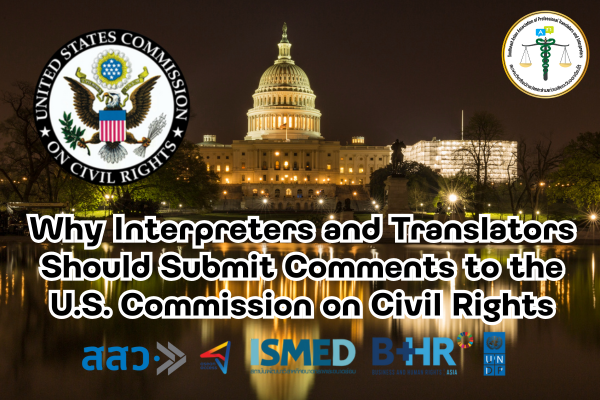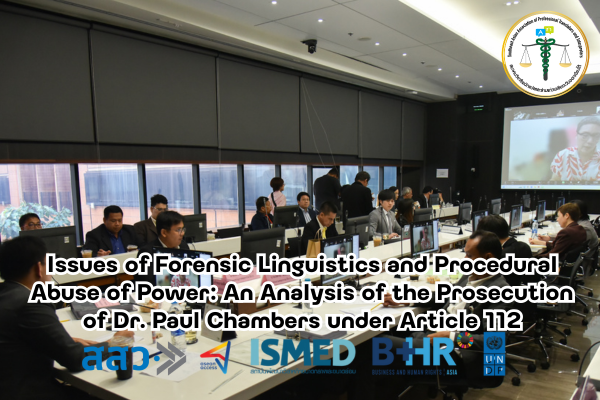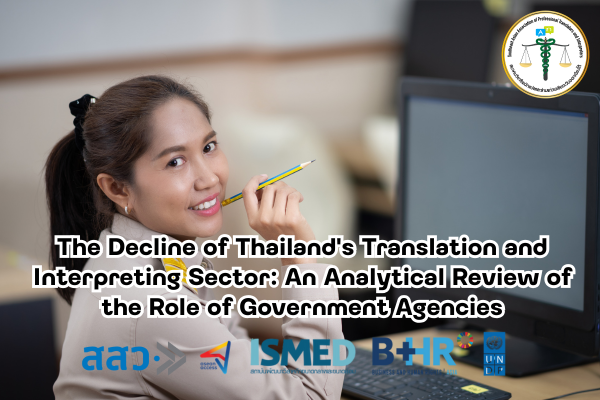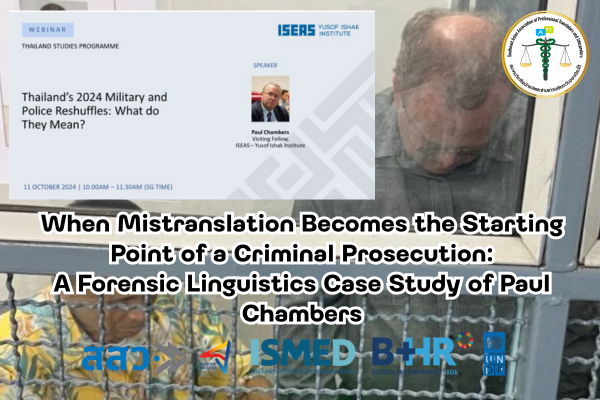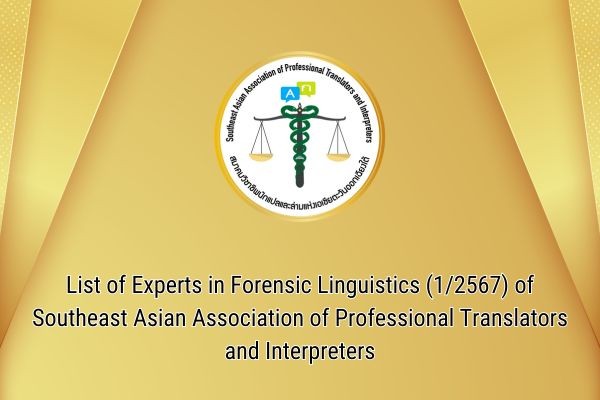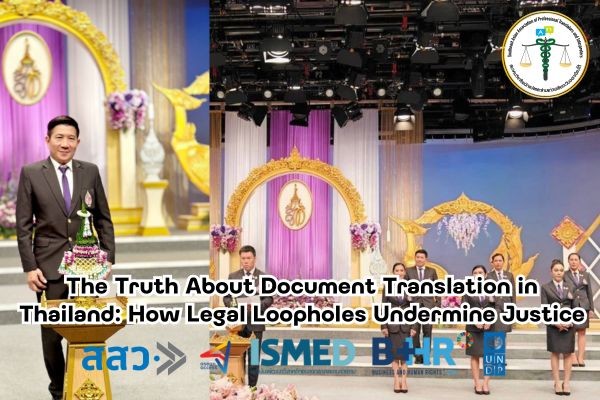Internal Regulation of the Southeast Asian Association of Professional Translators and Interpreters
Announcement No. 1/2024
Subject: Expert in Forensic Linguistics and Guidelines for Professional Practice
Pursuant to the resolution of the Executive Committee of the Southeast Asian Association of Professional Translators and Interpreters, it is deemed appropriate to establish the professional position of “Expert in Forensic Linguistics”, outlining its definition, roles, responsibilities, and operational guidelines as follows:
1. Definition of Forensic Linguistics by the Association
Forensic Linguistics is a branch of applied linguistics. Practitioners in this field integrate linguistic knowledge, particularly Critical Discourse Analysis, with legal studies to analyze language use in legal, investigative, and judicial contexts.
Analytical Framework:
- Examination of linguistic usage, structural elements, and semantic probability.
- Analysis of grammar, word choice, and nuances of communication.
2. Roles and Responsibilities of the Expert in Forensic Linguistics
Experts in Forensic Linguistics under the Association are entrusted with the following duties:
- Testifying as expert witnesses during police investigations and court proceedings.
- Assisting particularly in criminal cases related to defamation under Section 326 of the Criminal Code and related or derivative statutes.
Key Areas of Work:
- Authorship Identification: Analyzing writing samples to determine the authorship of texts for investigations into ransom notes, threatening letters, cyberbullying, and disputed historical documents.
- Disputes Involving Plagiarism or Intellectual Property Theft: Examining textual structures for deep-level similarities beyond explicit copying.
- Legal Document Interpretation: Clarifying complex legal language in contracts, wills, or statutory provisions to ensure mutual understanding among parties.
- Trademark Disputes: Analyzing whether trademarks or slogans are confusingly similar, potentially misleading consumers.
- Threat Assessment: Assisting law enforcement in evaluating the level of threat conveyed through intimidating communications and advising on investigative strategies.
- Confession Analysis: Reviewing police interviews or confessions for signs of coercion, misunderstanding, or distortion.
3. Methodologies Employed in Forensic Linguistic Analysis
Forensic Linguistics Experts of the Association utilize a scientific and linguistic approach, including:
- Detailed Analysis: Identifying patterns, inconsistencies, and subtle differences often overlooked by laypersons.
- Corpus Linguistics: Employing large textual databases for comparative and statistical support in findings.
- Comparative Analysis: Comparing disputed texts with known writing or speech samples.
- Computational Tools: Utilizing specialized software for authorship attribution and linguistic analysis.
4. Qualifications for Appointment as an Expert in Forensic Linguistics
Candidates must meet the following minimum qualifications:
- Relevant Educational Background: A Master’s degree in foreign languages or linguistics with coursework related to language studies must be reflected in the academic transcript.
- Professional Experience: Professional experience as a linguist, researcher, or university lecturer specializing in forensic discourse analysis or language in judicial contexts.
- Credibility: Publication of relevant academic work or membership in recognized professional associations supporting the candidate’s credibility.
- Professional Certification: Must possess the Association’s Certified Interpreter Level 3 (CI-3) qualification, authorizing professional practice as a Certified Interpreter under the Association’s authority.
5. Certification Process for Forensic Linguistics Experts
Step 1:
Completion of the training course “Expert Testimony in Police Investigations and Court Proceedings for Forensic Linguistics Experts”, accredited by the Association, including successful completion of theoretical and practical examinations.
Step 2:
Submission of the application for registration as an Expert in Forensic Linguistics, along with a registration fee of THB 3,000. Registration is valid for a period of 3 years. Registered experts will receive a professional ID card and a license to practice under the Association’s name.
6. Workplace Settings and Remuneration
Workplace Settings:
- Academic Institutions: Serving as lecturers or researchers specializing in forensic linguistics.
- Law Enforcement Agencies: Employed by major police departments or national agencies, or contracted for specific casework.
- Private Consulting Firms: Practicing independently, serving either defendants or plaintiffs.
- Courts: Engaged by courts for language analysis related to evidence and proceedings.
Remuneration:
- Allowance for court or police appearances: THB 300 per session (standard governmental rate in Thailand).
- Freelance consulting services: Recommended minimum professional fee of THB 6,000 per day, as advised by the Association.
This announcement shall take effect immediately and the position of Expert in Forensic Linguistics shall be incorporated into Chapter 9 of the Association’s Bylaws during the next amendment.
Issued on 22 April 2024.
(Signed)
Ms. Wanitcha Sumanat
President
Southeast Asian Association of Professional Translators and Interpreters
SEAProTI’s certified translators, translation certification providers, and certified interpreters:
The Southeast Asian Association of Professional Translators and Interpreters (SEAProTI) has officially announced the criteria and qualifications for individuals to register as “Certified Translators,” “Translation Certification Providers,” and “Certified Interpreters” under the association’s regulations. These guidelines are detailed in Sections 9 and 10 of the Royal Thai Government Gazette, issued by the Secretariat of the Cabinet under the Office of the Prime Minister of the Kingdom of Thailand, dated July 25, 2024, Volume 141, Part 66 Ng, Page 100.
To read the full publication, visit: the Royal Thai Government Gazette
ระเบียบภายในสมาคมวิชาชีพนักแปลและล่ามแห่งเอเชียตะวันออกเฉียงใต้
ประกาศเลขที่ 1/2567
เรื่อง ผู้เชี่ยวชาญด้านนิติภาษาศาสตร์ (Expert in Forensic Linguistics) และแนวทางในการปฏิบัติ
ด้วยความเห็นชอบของคณะกรรมการบริหาร สมาคมวิชาชีพนักแปลและล่ามแห่งเอเชียตะวันออกเฉียงใต้ จึงเห็นสมควรกำหนดตำแหน่ง “ผู้เชี่ยวชาญด้านนิติภาษาศาสตร์” พร้อมระบุที่มา บทบาท หน้าที่ และแนวทางในการปฏิบัติงาน ดังต่อไปนี้
1. นิยามนิติภาษาศาสตร์ของสมาคม
นิติภาษาศาสตร์ คือแขนงหนึ่งของภาษาศาสตร์ประยุกต์ ผู้เชี่ยวชาญในสาขานี้จะนำความรู้ด้านภาษาศาสตร์ โดยเฉพาะการวิเคราะห์วาทกรรมเชิงวิพากษ์ (Critical Discourse Analysis) มาประยุกต์ใช้ในบริบทของกฎหมาย การสืบสวนสอบสวนในคดีอาญา และกระบวนพิจารณาคดี
แนวทางการวิเคราะห์ภาษา:
- พิจารณาการใช้ภาษา โครงสร้างของภาษา และความน่าจะเป็นของความหมาย
- วิเคราะห์ไวยากรณ์ การเลือกใช้คำ และความละเอียดอ่อนในการสื่อสาร
2. บทบาทและหน้าที่ของผู้เชี่ยวชาญด้านนิติภาษาศาสตร์
ผู้เชี่ยวชาญด้านนิติภาษาศาสตร์ของสมาคมจะทำหน้าที่ดังนี้:
- ให้ถ้อยคำเป็นพยานผู้เชี่ยวชาญในชั้นสอบสวนและในกระบวนพิจารณาคดี
- สนับสนุนการวิเคราะห์ในคดีอาญา เช่น หมิ่นประมาทตามประมวลกฎหมายอาญา มาตรา 326 และมาตราที่เกี่ยวข้อง
ขอบเขตงานสำคัญ:
- การระบุตัวตนผู้เขียน: วิเคราะห์ข้อความเพื่อระบุผู้เขียน
- ข้อพิพาทด้านการละเมิดลิขสิทธิ์และการคัดลอกผลงาน: วิเคราะห์โครงสร้างทางภาษา
- การตีความเอกสารทางกฎหมาย: ช่วยให้ทุกฝ่ายเข้าใจถ้อยคำทางกฎหมายที่ซับซ้อน
- ข้อพิพาทเกี่ยวกับเครื่องหมายการค้า: วิเคราะห์ความสับสนที่อาจเกิดจากการใช้ภาษาคล้ายคลึงกัน
- การประเมินภัยคุกคาม: วิเคราะห์ภาษาที่ใช้ในการสื่อสารเชิงข่มขู่
3. องค์ประกอบในการวิเคราะห์ด้านนิติภาษาศาสตร์
การวิเคราะห์ของผู้เชี่ยวชาญจะใช้วิธีการทางวิทยาศาสตร์และภาษาศาสตร์ดังนี้:
- การวิเคราะห์อย่างละเอียด เพื่อค้นหารูปแบบ ความไม่สอดคล้อง และความแตกต่าง
- ภาษาศาสตร์คลังข้อมูล (Corpus Linguistics) เพื่อเปรียบเทียบข้อความด้วยข้อมูลเชิงสถิติ
- การวิเคราะห์เปรียบเทียบ ตัวอย่างงานเขียนและคำพูดของบุคคล
- เครื่องมือเชิงคำนวณ เช่น ซอฟต์แวร์วิเคราะห์ข้อความ
- การวิเคราะห์คำสารภาพ: ตรวจสอบความถูกต้องและความสมัครใจของคำให้การ
4. คุณสมบัติของผู้เชี่ยวชาญด้านนิติภาษาศาสตร์
ผู้ที่ได้รับการแต่งตั้งต้องมีคุณสมบัติดังนี้:
- จบการศึกษาระดับปริญญาโทขึ้นไปในสาขาภาษาต่างประเทศ หรือสาขาที่เกี่ยวข้องกับภาษาศาสตร์
- มีประสบการณ์การทำงาน เช่น นักภาษาศาสตร์ นักวิจัย หรืออาจารย์มหาวิทยาลัยในสาขานิติภาษาศาสตร์
- มีผลงานวิชาการตีพิมพ์ หรือเป็นสมาชิกสมาคมวิชาชีพที่เกี่ยวข้อง
- ได้รับคุณวุฒิวิชาชีพ “ล่ามรับรองระดับ 3 (ลว.3)” ของสมาคม
5. กระบวนการรับรองคุณวุฒิวิชาชีพ
ขั้นตอนที่ 1:
อบรมหลักสูตร “การเบิกความในชั้นพนักงานสอบสวนและกระบวนพิจารณาคดีในฐานะพยานผู้เชี่ยวชาญด้านนิติภาษาศาสตร์” ซึ่งรับรองโดยสมาคม และสอบผ่านตามเกณฑ์
ขั้นตอนที่ 2:
ยื่นสมัครจดทะเบียนเป็นผู้เชี่ยวชาญ พร้อมชำระค่าธรรมเนียม 3,000 บาท (อายุทะเบียน 3 ปี) เพื่อรับบัตรวิชาชีพและใบอนุญาต
6. สถานที่ปฏิบัติงานและค่าตอบแทน
สถานที่ปฏิบัติงาน:
- สถาบันการศึกษา
- หน่วยงานบังคับใช้กฎหมาย
- บริษัทที่ปรึกษาเอกชน
- ศาล
ค่าตอบแทน:
- พยานในสถานีตำรวจหรือศาล: ค่าป่วยการ 300 บาทต่อวัน
- การให้บริการอิสระ: ค่าบริการขั้นต่ำ 6,000 บาทต่อวัน (อัตราแนะนำโดยสมาคม)
ทั้งนี้ ตั้งแต่บัดนี้เป็นต้นไป และให้บรรจุวิชาชีพนี้ในหมวดที่ 9 ของข้อบังคับสมาคมในการแก้ไขเพิ่มเติมข้อบังคับครั้งถัดไป
ประกาศ ณ วันที่ 22 เมษายน พ.ศ. 2567
(ลงชื่อ)
นายวณิชชา สุมานัส
นายกสมาคมวิชาชีพนักแปลและล่ามแห่งเอเชียตะวันออกเฉียงใต้
เกี่ยวกับนักแปลรับรอง ผู้รับรองการแปล และล่ามรับรองของสมาคมวิชาชีพนักแปลและล่ามแห่งเอเชียตะวันออกเฉียงใต้
สมาคมวิชาชีพนักแปลและล่ามแห่งเอเชียตะวันออกเฉียงใต้ (SEAProTI) ได้ประกาศหลักเกณฑ์และคุณสมบัติผู้ที่ขึ้นทะเบียนเป็น “นักแปลรับรอง (Certified Translators) และผู้รับรองการแปล (Translation Certification Providers) และล่ามรับรอง (Certified Interpreters)” ของสมาคม หมวดที่ 9 และหมวดที่ 10 ในราชกิจจานุเบกษา ของสำนักเลขาธิการคณะรัฐมนตรี ในสำนักนายกรัฐมนตรี แห่งราชอาณาจักรไทย ลงวันที่ 25 ก.ค. 2567 เล่มที่ 141 ตอนที่ 66 ง หน้า 100 อ่านฉบับเต็มได้ที่: นักแปลรับรอง ผู้รับรองการแปล และล่ามรับรอง




